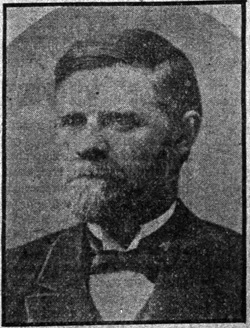The Sioux City Journal, September 26, 1901 (Photo of Civil War veteran)



The Sioux City Journal, September 26, 1901
THE BOYS IN BLUE OF ‘61
CHARLES H. LEWIS
Charles H. Lewis enlisted August 2, 1862, as a private in Company H, Twenty-seventh Iowa infantry. He was soon appointed sergeant major of his regiment, and later commissioned and mustered as adjutant. The regiment served over three years in Minnesota, Missouri, Arkansas, Louisiana, Kentucky, Tennessee, Mississippi, and Alabama, and on several islands in the Gulf, coursing the entire length of the Mississippi and along most of its tributaries. Comrade Lewis was never absent from the regiment and was off duty only three days during the entire period of service.
On the Red River campaign the battle of Old Oaks, La., was fought. It was a short, sharp fight. The enemy was hidden in the woods beyond an open cane field, sewered by open trenches extending from bayou to bayou. Across this open field, on which a few dead trees were standing, the union troops would have to go to meet the foe. The shells from the enemy’s batteries were flying thick and fast, and greater courage was required to advance than to, later, engage in actual conflict.
A colored man, who cared for the horses of the major and the adjutant, desiring to be ever ready if needed, watching the flying shells, became frightened and secured a safe position behind a tree, well curb and above ground cistern. After the battle was over, he said to Mr. Lewis:
“I watched behind de tree, well and cistern watching you and de majah ride across dat field, when a shell hit de dead tree close by you, and it flew and filled de air, and den you and de majah rode on so sanctified. Anoder shell came. It scattered de well curb, plunged through de cistern, and riddled de tree. De enemy was after me, but I escaped to de boats three miles away, and I’se safe and no time lost on dat trip. Oh, I’s so glad to see you safe and sanctified.”
“Probably sanctification won that fight,” remarked Judge Lewis, as he told this incident, “but many have thought it was won by the prompt refusal of Gen. William T. Shaw to obey orders as given.”



